-
State-level immigration policies should be subject of cost-benefit analysis
While immigration policy has been the purview of the U.S. federal government, nearly all states have taken a more-active role on the issue of unauthorized immigration in the past fifteen years through actions such as making drivers licenses available regardless of immigration status and requiring employers to verify eligibility to work, according to a new study. States, however, rarely examine the costs and benefits of such policies before enacting them, suggesting the need for a comprehensive tool to help state policymakers assess the full range of costs and benefits of immigration policies before they are adopted.
-
-
Mexican president compares Trump's “strident” rhetoric to Hitler and Mussolini
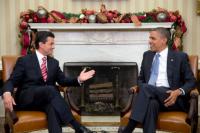
Mexico’s President Enrique Peña Nieto has said that comments by Donald Trump have damaged U.S.-Mexico relationships, and compared Trump’s “strident” tone to those of fascist leaders Adolf Hitler and Benito Mussolini. In his most direct comments so far on Trump’s assertions, Peña Nieto completely rejected the idea that Mexico would cover the cost of Trump’s proposed border wall.
-
-
Amnesty slams EU-Turkey refugee deal
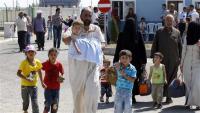
The EU and Turkey are about to reach a deal over the fate of more than a million refugees which have made it to Europe in the last eighteen months. The deal will be based on “one stays, one goes” principle: Turkey has agreed in principle to take back one refugee for every refugee the EU countries agree to allow to stay in Europe. Amnesty International “shows an alarmingly short-sighted and inhumane attitude to handling this crisis.”
-
-
The real cost of CBP’s failed SBInet is $1.389 billion
Since its approval by Congress in 2006, the exact cost to taxpayers of the Secure Border Initiative network (SBInet) has remained difficult to substantiate. The real cost to date of the failed SBInet program , a cost which excludes the SBInet impact upon both federal agents, border residents, and border crossers, far exceeds the commonly used estimate of $1 billion. The quality, utility, and efficiency of CBP’s failed SBInet program should be judged, like any other federal program, by its real cost to the public. According to government data, that cost to date is $1.389 billion.
-
-
Mexico, “emphatically and categorically,” says it would not pay for border wall
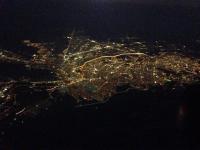
The Mexican government has made its first public response to Donald Trump’s assertions that he would not only build a wall along the U.S.-Mexico border, but also make Mexico pay for it. “I say it emphatically and categorically: Mexico, under no circumstance, is going to pay for the wall that Mr. Trump is proposing,” the Mexican treasury secretary, Luis Videgaray, said late on Wednesday.
-
-
U.K. national security imperiled by delays in e-Border project
British lawmakers warned that national security could be imperiled by the protracted hold-ups in implementing a £1.1 billion system of border checks. The lawmakers accused the Home Office of unwarranted confidence over the introduction of the e-Borders program, due to become fully operational in 2019, eight years later than originally planned. Parliament’s Public Accounts Committee told the Home Office to “get its house in order now” over the project.
-
-
Russia, Syria triggered refugee crisis to destabilize Europe: NATO commander
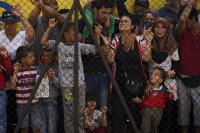
General Phil Breedlove, NATO’s Supreme Allied Commander for Europe and head of the U.S. European Command, said Russia and Syria are indiscriminately bombing Syrian civilians to drive the refugee crisis and “weaponize migration.”He said that weapons such as barrel bombs, widely used by the Assad regime against Sunni civilian population, have no military value, and are used solely to terrorize those living in rebel-held territories. He told the Senate Armed Services Committee that the destruction formed part of a deliberate strategy by Russia and the Assad regime to “get them on the road” and “make them a problem for someone else.”
-
-
ISIS “spreading like cancer” among refugees: NATO commander
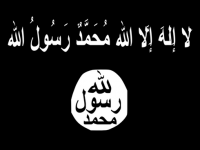
General Philip Breedlove, NATO’s top commander, on Tuesday told a congressional panel that refugees from the Middle East and north Africa are “masking the movement” of terrorists and criminals. In testimony to the Senate Armed Services Committee, Breedlove said that ISIS is “spreading like a cancer” among refugees. The group’s members are “taking advantage of paths of least resistance, threatening European nations and our own,” he said.
-
-
UN warns of imminent humanitarian crisis in Greece
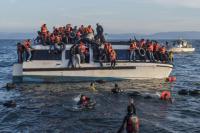
Europe faces an imminent humanitarian crisis, largely of its own making, following a rapid build-up of people in already over-stretched Greece, UNHCR, the UN Refugee Agency, warned. “With governments not working together despite having already reached agreements in a number of areas, and country after country imposing new border restrictions, inconsistent practices are causing unnecessary suffering and risk being at variance with EU and international law standards,” UNHCR spokesperson Adrian Edwards told a press briefing in Geneva.
-
-
Swiss voters reject automatic deportation of foreigners who committed crimes
Swiss voters, in a Saturday referendum, rejected a proposal by a nationalist party automatically to deport foreigners who commit even low-level offenses such as traffic violations. Public opinion indicated a tight vote, but the measure was easily defeated by a margin of 58.9 percent to 41.1 percent. EU leaders welcomed the referendum result.
-
-
Two former Mexican presidents: Trump “like Hitler” in stirring hatred along ethnic lines
Two former presidents of Mexico, Felipe Calderon and Vicente Fox, said Donald Trump was stirring up hate along ethnic lines in a manner similar to that of Hitler. In Twitter message to his followers ahead of Super Tuesday vote, Trump quoted the words of Italy’s fascist dictator Benito Mussolini.
-
-
Mexicans worry Trump’s rhetoric will poison U.S.-Mexico relations
Donald Trump’s pledge to build a wall along the U.S.-Mexico border – and make Mexico pay for it – has elicited pointed criticism from two former Mexican presidents, Felipe Calderon and Vicente Fox. Even if the border wall is never built, leading politicians and academics in Mexico worry that Trump’s comments will lead to harsher U.S. border policy and disrupt the process of growing economic and political ties between the two countries, a process which began two decades ago with the NAFTA agreement.
-
-
Changes in EU policy needed to address migrant crisis: Experts
More than 3,700 people were believed to have drowned in the Mediterranean during 2015. Alongside these tragic developments, increasing levels of migration along the Balkan route have been met by border closures within the EU, with growing tensions exacerbating humanitarian challenges across the wider region. EU Member States have struggled to adopt a unified approach to handling the issue. New study indicates deterrent measures such as anti-smuggling are ineffective and an alternative is needed.
-
-
Immigration overall not a source of terrorism: Study
Migration is overall not a source of terrorism, according to new research. In fact the study indicates that more migration could create a decrease in the number of terrorist attacks. However, the research suggests some terror attacks can be linked to migration from terror-prone states.
-
-
Texas to re-classify immigrant detention centers as child-care facilities
In 2015 a judge ordered Texas to shut down two immigration detention centers – but in order to escape implementing the judge’s order, Texas is considering re-classifying the two detention centers as “child-care facilities.” The Texas Department of Family and Protective Services had to address a July 2015 decision from federal Judge Dolly Gee. Gee ruled that the country’s three family detention centers (a third facility is in the process of being shut down) were holding children in “deplorable conditions” that “failed to meet even the minimal standard” for a safe and clean environment for children.
-
- All
- Regional
- Water
- Biometrics
- Borders/Immig
- Business
- Cybersecurity
- Detection
- Disasters
- Government
- Infrastructure
- International
- Public health
- Public Safety
- Communication interoperabillity
- Emergency services
- Emergency medical services
- Fire
- First response
- IEDs
- Law Enforcement
- Law Enforcement Technology
- Military technology
- Nonlethal weapons
- Nuclear weapons
- Personal protection equipment
- Police
- Notification /alert systems
- Situational awareness
- Weapons systems
- Sci-Tech
- Sector Reports
- Surveillance
- Transportation
Advertising & Marketing: advertise@newswirepubs.com
Editorial: editor@newswirepubs.com
General: info@newswirepubs.com
2010-2011 © News Wire Publications, LLC News Wire Publications, LLC
220 Old Country Road | Suite 200 | Mineola | New York | 11501
Permissions and Policies
Editorial: editor@newswirepubs.com
General: info@newswirepubs.com
2010-2011 © News Wire Publications, LLC News Wire Publications, LLC
220 Old Country Road | Suite 200 | Mineola | New York | 11501
Permissions and Policies
